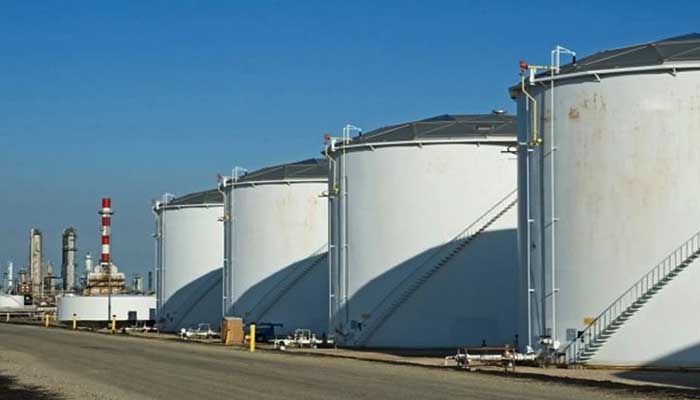Govt opens Kohat oil depot to boost storage capacity
The re-opening of the depot will add approximately 2,000 kilo litres to the country’s storage capacity
ISLAMABAD: The Economic Coordination Committee (ECC) of the cabinet on Wednesday approved a proposal for the re-opening of the Kohat oil depot under the inland freight equalisation margin mechanism.
The re-opening of the depot will add approximately 2,000 kilo litres to the country’s storage capacity, according to ECC meeting presided over by Minister for Finance and Revenue Shaukat Tarin.
In a separate meeting with delegation of representatives of oil refineries, Tarin directed the officers of finance division and the Federal Board of Revenue to come with proposals regarding the oil refineries policy in consultation with all stakeholders.
The meeting was informed that local oil refineries cater for 55 percent of petroleum needs of the country and directly contribute to energy security. Installation of oil refineries requires heavy investment.
Last refineries policy was announced by the government in 1997. Since then, due to change in realities on the ground, working for oil refineries has become more difficult with the passage of time. Oil refineries currently are facing multiple problems including decline in profit margins. They emphasised the need for government support for increased investments to meet the requirement of Euro-v fuels and value-added products through installation of deep conversion refineries.
The ECC also approved Rs4.52 billion grants for pension support on the request of the ministry of overseas Pakistanis and human resource development and sought proposals to change oil refineries policy.
The ECC decided that Employees' Old-Age Benefits Institution (EOBI) meet expenditures from own resources as it is a self-financing entity.
The board of trustees of EOBI was also directed to look into other possibilities of meeting the pension liabilities.
The ECC approved the summary moved by the ministry of energy (petroleum division) for the revalidation of the ECC approval for exploration activities in Block-8 Iraq by Pakistan Petroleum Limited (PPL). Government allowed PPL to undertake the committed exploration activities with a minimum financial obligation of $100 million in 2012, out of which $77.6 million have already have been invested. ECC allowed the revalidation with the direction to the PPL board to revalidate feasibility of investment.
The ECC also approved the proposal of the ministry of maritime affairs for appointment of foreign engineering consultant for planning, preparing, reviewing and updating of port master plan of Port Qasim Authority. All matters where the authority is using its own funds, after following the standard procedures, may be decided by the boards/ ministries for ensuring efficient progress on important matters.
The ECC also approved technical supplementary grants of Rs873.3 million for the ministry of defence for meeting the expenses of its various executive departments, Rs1.5 billion for the finance division for providing food subsidy in Kashmir, Rs250 million for national heritage and culture division for establishing government artist welfare fund, and Rs150 million for the revenue division to meet its operating expenses.
For ministry of interior, the committee approved Rs5 billion for the phase-III of civil armed forces raising, Rs190 million for paying off liabilities on account of internal security duty allowance, Rs320 million for meeting the outstanding administrative expenses, Rs204.1 million for pending liabilities of the shuhada families, Rs957 million for employee related expenses of Pakistan Rangers (Punjab), and Rs456 million for requirements of sustainable goal achievement program.
Three other technical supplementary grants of Rs1.76 billion, Rs3.25 billion and Rs7.87 billion were approved for the finance division for providing funds to Khyber Pakhtunkhwa and Punjab governments for strengthening hospitals and for effective response to COVID-19 and other natural calamities.
-
 Nancy Guthrie Abduction: Piers Morgan Reacts To 'massive Breakthrough' In Baffling Case
Nancy Guthrie Abduction: Piers Morgan Reacts To 'massive Breakthrough' In Baffling Case -
 Adam Mosseri Set To Testify In Court Over Social Media Addiction Claims
Adam Mosseri Set To Testify In Court Over Social Media Addiction Claims -
 Will Warner Bros Finalize Deal With Paramount Or Stays Loyal With Netflix's Offer?
Will Warner Bros Finalize Deal With Paramount Or Stays Loyal With Netflix's Offer? -
 Palace Spotlights Queen Camilla For Her Work With Vision-impaired Children A Day After Andrew Statement
Palace Spotlights Queen Camilla For Her Work With Vision-impaired Children A Day After Andrew Statement -
 Kim Kardashian Still 'very Angry' At Meghan Markle, Prince Harry
Kim Kardashian Still 'very Angry' At Meghan Markle, Prince Harry -
 Texas Father Guns Down Daughter After Heated Trump Argument
Texas Father Guns Down Daughter After Heated Trump Argument -
 Andrew, Sarah Ferguson Quietly Adopts New Strategy To Control Public Narrative
Andrew, Sarah Ferguson Quietly Adopts New Strategy To Control Public Narrative -
 Harry Styles Refuses To Apologise For High Tour Ticket Prices In Rude Response: Source
Harry Styles Refuses To Apologise For High Tour Ticket Prices In Rude Response: Source -
 Ariana Grande Opens Up About ‘dark’ PTSD Experience
Ariana Grande Opens Up About ‘dark’ PTSD Experience -
 Angelina Jolie Says It Loud: 'Scars Define My Life'
Angelina Jolie Says It Loud: 'Scars Define My Life' -
 Climate-driven Wildfires Scorch Some Of World’s Oldest Trees In Patagonia
Climate-driven Wildfires Scorch Some Of World’s Oldest Trees In Patagonia -
 King Charles’ Ignorance Over Andrew & Jeffrey Epstein Not True? Foreign Office, MI6’s Work Comes Out
King Charles’ Ignorance Over Andrew & Jeffrey Epstein Not True? Foreign Office, MI6’s Work Comes Out -
 Police Detained 'innocent' Man In Nancy Guthrie's Kidnapping
Police Detained 'innocent' Man In Nancy Guthrie's Kidnapping -
 Co-founders Of Elon Musk's XAI Resigned: Here's Why
Co-founders Of Elon Musk's XAI Resigned: Here's Why -
 Dakota Johnson Reveals Smoking Habits, The Leading Cause Of Lung Cancer
Dakota Johnson Reveals Smoking Habits, The Leading Cause Of Lung Cancer -
 FAA Shuts Down El Paso Airport, Flights Suspended For 10 Days: Here’s Why
FAA Shuts Down El Paso Airport, Flights Suspended For 10 Days: Here’s Why




